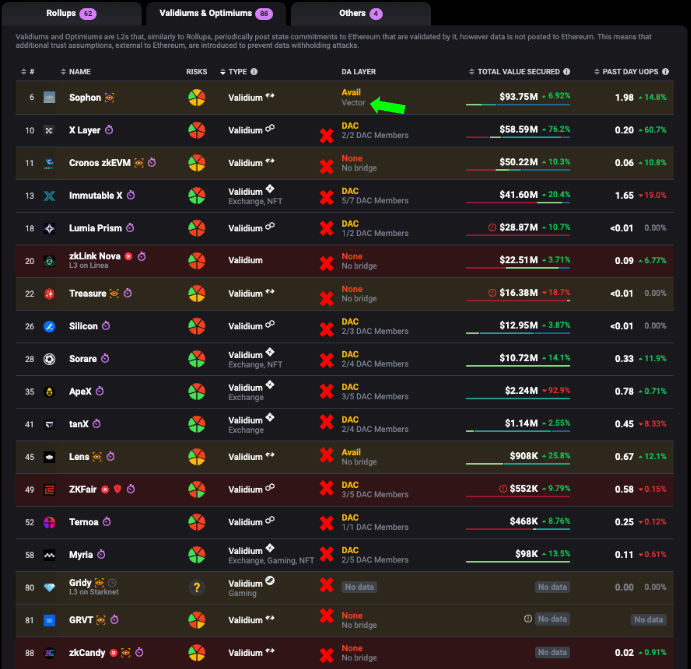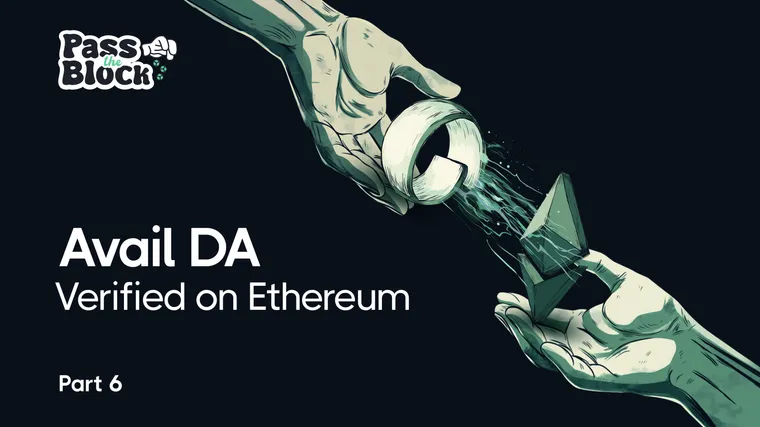In just four months since launch, Sophon has achieved several major milestones, most recently, it has become the first ever validium to have its data attestations bridged to Ethereum. This breakthrough allows an Ethereum smart contract to confirm that Sophon’s transaction data is available on Avail’s blockchain, strengthening the link between the Avail and Ethereum ecosystems, while advancing trust minimized scalability for Ethereum.
What Is A Validium?
A validium is a scaling solution similar to rollups that process transactions off-chain while using zero-knowledge proofs to verify correctness on Ethereum. Unlike ZK-rollups however, validiums keep transaction data (data availability) off Ethereum, to improve throughput and reduce costs.
Validiums introduce a trust assumption, namely that transaction data could be withheld from users, resulting in frozen funds. To get around this, Avail has launched a blockchain network that’s optimized for managing decentralized transaction data at scale. Avail’s blockchain supports more than 100 validators, it provides industry leading stake distribution with a Nakamoto Coefficient of 35 (2nd overall) and has validity proofs that allow user’s to verify transaction data is available from their phone within ~40 seconds. Avail has significantly reduced the trust assumptions and vulnerability concerns that were being conceived when the validium architecture was first being talked about.
Now that Sophon is the first ever validium to have its data attestations bridged to Ethereum, this reduces trust assumptions for the Ethereum ecosystem one step further, as smart contracts on Ethereum can now verify that Sophon’s transaction data is available (on Avail) too.
Now that Sophon is the first ever validium to have its data attestations bridged to Ethereum, this reduces trust assumptions for the Ethereum ecosystem one step further, as smart contracts on Ethereum can now verify that Sophon’s transaction data is available (on Avail) too.

Why Does Sophon Need A Validium?
Sophon’s mission is to become the go-to platform for consumer-friendly blockchain products, used by existing and new users alike. A big part of this is making the experience as seamless as possible, and Sophon feels that most users will be unwilling to pay for individual transactions, as it’s just not something they have ever experienced online. Keeping transaction fees low while enabling extremely high-throughput was a key driver for Sophon choosing to build a validium instead of a rollup.
Even with the EIP-4844 upgrade on Ethereum, the majority of Ethereum blockspace is being used up by rollups eager to post their data there. The Base rollup for example regularly consumes a third of the available capacity, recently paying around $50,000 in fees per week, with some weeks spiking to over half a million dollars.
Sophon has already published over 10.5GB of data to avail, costing just a few hundred dollars. This puts the running costs of a validium on avail, at a fraction of the cost of running a rollup.
So then, what are some of the things that Sophon has achieved with all of this?
- Processed more than 60 million transactions
- Verified 8.8m jobs for decentralized cloud compute provider Aethir
- Generated more than $1.4m in revenue for the OPEN Ticketing ecosystem
- Secured $15m TVL on the SyncSwap DEX.
A New Era For Scaling Ethereum
L2beat, a popular service that monitors Ethereum scaling solutions, have stated that in less than 2 months a chain that posts data off Ethereum will require trust-minimized DA attestations (through an integration like Sophon’s) for L2s to be classified in the optimiums and validiums category.
This would reduce the current listings from 88 to only 2, with Sophon as the only validium (because it uses ZK proofs instead of fraud proofs to verify transaction execution). Sophon shows us how modern blockchain applications can not only scale to support high-throughput use cases but keep costs down while retaining trust-minimized verification.
If you’re looking to bridge data attestations to Ethereum from a validium or optimium then take a look at VectorX to learn more about Sophon’s integration.


